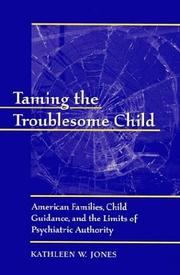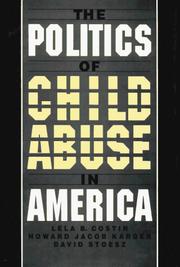| Listing 1 - 3 of 3 |
Sort by
|

ISBN: 0674868110 9780674868113 Year: 1999 Publisher: Cambridge, Mass: Harvard university press,
Abstract | Keywords | Export | Availability | Bookmark
 Loading...
Loading...Choose an application
- Reference Manager
- EndNote
- RefWorks (Direct export to RefWorks)
Child mental health services --- Child guidance clinics --- Problem children --- Problem youth --- History --- United States --- 20th century --- Child mental health services - United States - History - 20th century --- Child guidance clinics - United States - History - 20th century --- Problem children - United States - History - 20th century --- Problem youth - United States - History - 20th century

ISBN: 0195353765 1429414685 9781429414685 9786610529612 6610529612 0195089308 9780195089301 0195116682 9780195116687 0190283459 Year: 1996 Publisher: New York ; Oxford : Oxford University Press,
Abstract | Keywords | Export | Availability | Bookmark
 Loading...
Loading...Choose an application
- Reference Manager
- EndNote
- RefWorks (Direct export to RefWorks)
Child abuse policy in the United States contains dangerous contradictions. The rapidly expanding child abuse industry (made up of enterprising psychotherapists and attorneys) consumes enormous resources, while thousands of poor children are seriously injured or killed, many while under the ""protection"" by public agencies. Meanwhile, the public child abuse system has become a virtual ""nonsystem,"" marked by a staggering turnover of staff, unmanageable caseloads, a severe shortage of funding, and caseloads composed of highly dysfunctional families. In The Politics of Child Abuse in America...
Abused children -- Services for -- United States -- History. --- Child abuse -- United States -- Prevention -- History. --- Electronic books. -- local. --- Social work with children -- United States -- History. --- Abused children --- Child abuse --- Social work with children --- Social Welfare & Social Work - General --- Social Welfare & Social Work --- Social Sciences --- Children --- Abuse of children --- Child maltreatment --- Child neglect --- Cruelty to children --- Maltreatment of children --- Neglect of children --- Child welfare --- Family violence --- Parent and child --- Battered children --- Child abuse victims --- Maltreated children --- Victims of child abuse --- Victims of crimes --- Adult child abuse victims --- Services for --- History --- Prevention --- Abuse of --- Crimes against --- History.
Book
ISBN: 9780691162577 0691162573 9780691178202 0691178208 1400880432 Year: 2016 Publisher: Princeton, NJ : Princeton University Press,
Abstract | Keywords | Export | Availability | Bookmark
 Loading...
Loading...Choose an application
- Reference Manager
- EndNote
- RefWorks (Direct export to RefWorks)
The End of American Childhood takes a sweeping look at the history of American childhood and parenting, from the nation's founding to the present day. Renowned historian Paula Fass shows how, since the beginning of the American republic, independence, self-definition, and individual success have informed Americans' attitudes toward children. But as parents today hover over every detail of their children's lives, are the qualities that once made American childhood special still desired or possible? Placing the experiences of children and parents against the backdrop of social, political, and cultural shifts, Fass challenges Americans to reconnect with the beliefs that set the American understanding of childhood apart from the rest of the world.Fass examines how freer relationships between American children and parents transformed the national culture, altered generational relationships among immigrants, helped create a new science of child development, and promoted a revolution in modern schooling. She looks at the childhoods of icons including Margaret Mead and Ulysses S. Grant-who, as an eleven-year-old, was in charge of his father's fields and explored his rural Ohio countryside. Fass also features less well-known children like ten-year-old Rose Cohen, who worked in the drudgery of nineteenth-century factories. Bringing readers into the present, Fass argues that current American conditions and policies have made adolescence socially irrelevant and altered children's road to maturity, while parental oversight threatens children's competence and initiative.Showing how American parenting has been firmly linked to historical changes, The End of American Childhood considers what implications this might hold for the nation's future.
Families --- Parenting --- Children --- History. --- History --- Families - United States - History. --- Parenting - United States - History. --- Children - United States - History. --- Adolescence. --- Adoption. --- Adult. --- Advertising. --- African Americans. --- Alexis de Tocqueville. --- American Dream. --- American Vision. --- Americans. --- Aunt. --- Benjamin Spock. --- Bilkent University. --- Birth control. --- Career. --- Center for Advanced Study in the Behavioral Sciences. --- Child abuse. --- Child care. --- Child development. --- Child mortality. --- Child savers. --- Childhood. --- Children's rights. --- Classroom. --- Claude Steele. --- Culture of the United States. --- Developmental psychology. --- Early childhood. --- Edith Abbott. --- Erik Erikson. --- G. Stanley Hall. --- Gender role. --- Grace Abbott. --- Grandparent. --- Grief. --- Harriet Beecher Stowe. --- Harvard University Press. --- His Family. --- Household. --- Immigration. --- Indulgence. --- Industrialisation. --- Infant. --- Institution. --- Jane Addams. --- Jews. --- John Dewey. --- Juvenile court. --- Juvenile delinquency. --- Kastamonu University. --- Kate Douglas Wiggin. --- Latin America. --- Lecture. --- Literacy. --- Literature. --- Margaret Mead. --- Marriage. --- Middle class. --- Mother. --- Mrs. --- National Association for the Advancement of Colored People. --- National Child Labor Committee. --- Neglect. --- New media. --- Newspaper. --- Obedience (human behavior). --- Of Education. --- Oxford University Press. --- Palo Alto University. --- Parent. --- Parenting. --- Patriarchy. --- Philosopher. --- Physician. --- Politics. --- Popular culture. --- Profession. --- Progressive education. --- Psychiatrist. --- Psychoanalysis. --- Psychologist. --- Psychology. --- Public school (United Kingdom). --- Racial segregation in the United States. --- Requirement. --- Rutgers University. --- Sibling. --- Sigmund Freud. --- Slavery. --- Social science. --- Society of the United States. --- Society. --- Sociology. --- Tel Aviv University. --- To This Day. --- Toilet training. --- University of California, Berkeley. --- University of Victoria. --- Wealth. --- World War II. --- Youth.
| Listing 1 - 3 of 3 |
Sort by
|

 Search
Search Feedback
Feedback About UniCat
About UniCat  Help
Help News
News